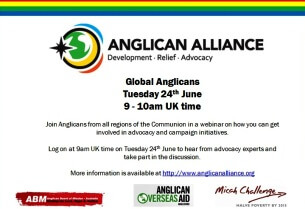A full recording of the webinar is now available on our website.
Tagolyn Kabekabe, the Anglican Alliance’s Pacific Facilitator, summarised the webinar when she said, “The global community need to have a listening ear – to listen to the most vulnerable rather than telling them what to do. Then we can begin to work together on these issues.”
Tagolyn spoke alongside a group of Anglicans from the Pacific and Australia who have been collaborating on climate change advocacy at the C20 Summit in Australia. Presentations from the Anglican Alliance, Anglican Board of Mission, Anglican Overseas Aid and Micah Challenge Australia, all encouraged the local church to take part in campaigns and initiate advocacy on a local and global level.
Tagolyn spoke specifically about climate change in the Pacific, and called on world leaders and decision-makers to listen to the voices of local people.
She gave an outline of her involvement in the recent C20 Summit in Melbourne, Australia, which brought together civil society representatives to discuss key issues in the run up to the G20 Summit in November 2014. You can see a video of her participation at the C20 here.
Questions from participants in Australia, Bangladesh, the Caribbean, Kenya, the UK, and Vanuatu all highlighted the need for the church to be involved in external campaigns, engage with policy in a local and a global context, and initiate advocacy to speak out with the most vulnerable.
Brad Chapman, Education Missioner for Anglican Board of Mission, gave an outline of why Christians are involved in advocacy and our theological foundations for taking part in advocacy initiatives.
Brad asked the question, “What is distinctive about the Anglican voice?” He drew on the Five Marks of Mission to explain our call to advocate for the most vulnerable, and said, “We need to be the ones who speak truth to power.”
David Cook, Communications and Policy Advisor at Anglican Overseas Aid, then spoke about the essential need for communications, public relations and media to be a part of any advocacy campaign. He said, “Using these tools are an essential part of any advocacy initiative. They mustn’t be thought of as just another add-on.”
David highlighted the importance of building strong relationships with both the community as well as leaders and decision-makers in order to make advocacy effective.
A final presentation was made by Ben Thurley, who is the Political Engagement Coordinator for Micah Challenge Australia. He gave two examples of grassroots faith-based engagement with advocacy initiatives to address social issues from a local perspective.
Ben outlined the recent Voices for Justice event that takes place every year in Canberra, Australia, and brings the community closer to their politicians and decision-makers. The event gathers Christians across Australia to raise their voices and influence government policy for the benefit of the world’s poorest people.
Ben then spoke further about the ‘Christian Commitment to Building a New Nepal’, and his experience as an advocacy advisor with the United Mission to Nepal.
The panel was chaired by Anglican Alliance Co-Director Revd Andy Bowerman who called in from Brazil. Andy brought the audience questions to the panel, which covered broad topics such as women’s empowerment in advocacy training and skills, as well as specific advice on local advocacy initiatives in varying cultural contexts.
Answering a question on how local churches can be involved in global advocacy initiatives, Andy highlighted the United Nations MY World campaign, which brings the voices of the grassroots to the post-2015 development agenda. The Anglican Alliance have a partner page at http://vote.myworld2015.org/?partner=alliance where you can vote and raise your voice to the UN High-Level Panel for the post-2015 goals.
Brad Chapman encouraged participants to make use of pathways such as the Anglican Alliance’s MY World page to engage with global advocacy and ensure the faith-based voice is heard.
A group of participants in Nairobi, Kenya, included ten Provincial Mothers’ Union Coordinators and the Anglican Alliance’s Africa Facilitator June Nderitu. They wrote in to give an example of how their church is advocating with government representatives to enhance their efforts:
“In Africa we have been discussing how the church can form partnerships with government, UN Bodies and Civil Society Organisations as a way of influencing policy and raising the church voices. We are seeing that our advocacy is enhanced by partnerships with government and others, where we can educate the community on the existing laws and what needs to change.”
A full recording of the webinar, which was kindly hosted by Workcast, will be available to view on our website soon. You can access an outline of each presentation as well as presenter biographies below.
Relevant documents to download

